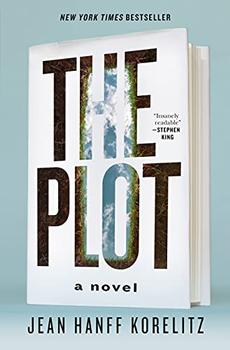Summary | Excerpt | Reviews | Beyond the Book | Readalikes | Genres & Themes | Author Bio

But first, he had to deliver on that Ripley fantasy that they were all, "students" and "teachers" alike, colleagues-in-art, each with a unique voice and a singular story to tell with it, and each equally deserving of being called that magical thing: a writer.
It was just past seven and still raining. By the time he met his new students the following evening at the welcome cookout he would have to be all smiles, all personal encouragement, and full of such scintillating guidance that each new member of the Ripley Symposia Master of Fine Arts Program might believe the "gifted" (Philadelphia Inquirer) and "promising" (Boston Globe) author of The Invention of Wonder was personally prepared to usher them into the Shangri-La of Literary Fame.
Unfortunately, the only path from here to there led through those twelve folders.
He turned on the standard Richard Peng desk lamp and sat down in the standard Richard Peng office chair, which gave a loud squeak as he did, then he spent a long moment tracing a line of grime along the ridges of the cinder blocks on the wall beside his office door, delaying till the last possible moment the long and deeply unpleasant evening that was about to commence.
How many times, looking back at this night, the very last night of a time he would always afterward think of as "before," would he wish that he hadn't been so utterly, fatally wrong? How many times, in spite of the astonishing good fortune set in motion by one of those folders, would he wish he'd backed his way out of that sterile office, retraced his own muddy footprints down the corridor, returned to his car, and driven those many hours back to New York and his ordinary, personal failure? Too many, but no matter. It was already too late for that.
CHAPTER TWO
The Hero's Welcome
By the time the welcome cookout commenced the following afternoon Jake was running on fumes, having dragged himself into that morning's faculty meeting after a scant three hours' sleep. It had been a small victory this year that Ruth Steuben was finally shifting the students who self-identified as poets away from him and to other teachers who also self-identified as poets (Jake had nothing of value to teach aspiring poets. In his experience, poets often read fiction, but fiction writers who said they read poetry with any regularity were liars), so it could at least be said that the dozen students he'd been assigned were prose writers. But what prose it was! In his through-the-night and fueled-by-Red-Bull readthrough, narrative perspective hopped about as if the true narrator was a flea, traipsing from character to character, and the stories (or … chapters?) were so simultaneously flaccid and frenetic that they signified—at worst, nothing, and at best, not enough. Tenses rolled around within the paragraphs (sometimes within the sentences!) and words were occasionally used in ways that definitely implied the writer was not overly clear on their meanings. Grammatically, the worst of them made Donald Trump look like Stephen Fry and most of the rest were makers of sentences that could only be described as … utterly ordinary.
Encompassed in those folders had been the shocking discovery of a decaying corpse on a beach (the corpse's breasts had been, incomprehensibly, described as "ripe honeymelons"), a writer's histrionic account of discovering, via DNA test, that he was "part African," an inert character study of a mother and daughter living together in an old house, and the opening of a novel set in a beaver dam "deep in the forest"). Some of these samples had no particular pretensions to literature, and would be easy enough to deal with—nailing down the plot and red-penciling the prose into basic subservience would be enough to justify his paycheck and honor his professional responsibilities—but the more self-consciously "literary" writing samples (some of them, ironically, among the worst written) were going to suck his soul. He knew it. It was already happening.
Excerpted from The Plot by Jean Korelitz. Copyright © 2021 by Jean Korelitz. Excerpted by permission of Celadon. All rights reserved. No part of this excerpt may be reproduced or reprinted without permission in writing from the publisher.
Knowledge is of two kinds. We know a subject ourselves, or we know where we can find information on it.
Click Here to find out who said this, as well as discovering other famous literary quotes!
Your guide toexceptional books
BookBrowse seeks out and recommends the best in contemporary fiction and nonfiction—books that not only engage and entertain but also deepen our understanding of ourselves and the world around us.